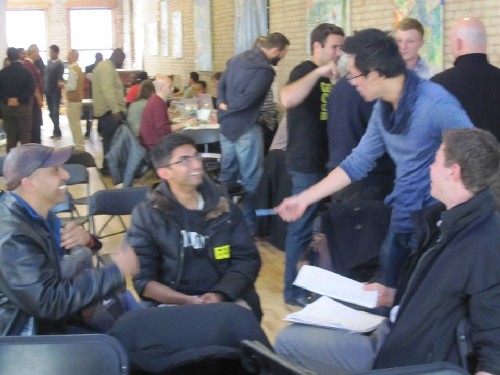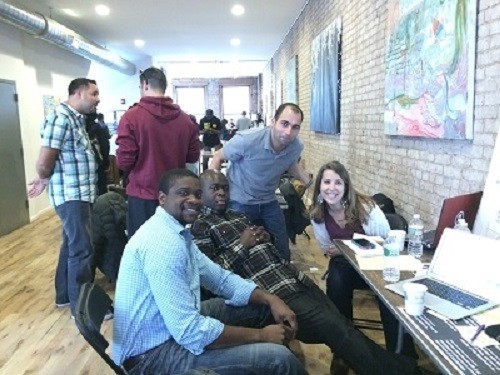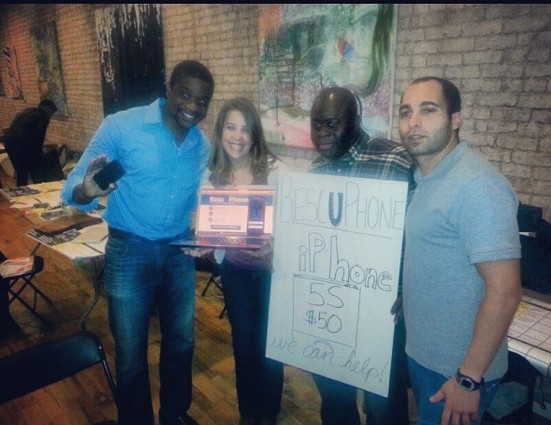At Lean Newark, Long, Intensive Weekend Yields Winners With Real Customers
NJTechWeekly.com attended Lean Startup Machine Newark Nov. 10, 2013, to hear the final pitches from the eight teams that stayed on for the “long, hard, intensive” weekend, as Joe Lopardo, the Lean facilitator, called it.

The winning team was RescUPhone and the runner-up Glutenado, but the real winners were the teams that got to practice and learn from the lean customer validation experience during the weekend of November 8–10.
The winner was eligible for a guaranteed interview to join the LaunchPad 3 cohort at tech accelerator TechLaunch (Clifton). The companies also received consulting services from many mentors who had participated in the gathering.
Judging the event were a number of well-known members of the New Jersey tech community. They included John Frankel of ff Venture Capital, which recently added a Hoboken office; Jonathan Hakakian of SoundBoard Angel Fund, a Morristown-based angel group; and Travis Kahn, executive director of TechLaunch.

Also judging were Clark Lagemann, cofounder of myHint (Somerset), a healthcare IT startup; Lyneir Richardson, CEO of Brick City Development Corp., Newark’s economic development agency; and Guy Story, chief technology officer of Audible.com, the Newark technology company that was bought by Amazon.com. Audible develops audiobooks and related technology.
Richardson told those gathered, “We are intentional about saying we want more high-tech entrepreneurs in the city. We want to give you a warm embrace, show you around and show you space, and help you find customers and help you grow. We want you here.”

RescUPhone began with the assumption that its product would be for early adopters who wanted a new, updated phone but had to wait for the contract to run out, team leader Emeka Oguh, who was born and raised in Newark said. The team thought consumers eligible for cellphone upgrades who didn’t want them could sell them to others who did.
They hit the streets to validate their idea. The reaction was positive, but they found that the market for the idea wasn’t early adopters — it was prepaid customers who don’t have the option of getting a phone; people who had lost their phones, had them stolen or had broken them; and international customers who couldn’t enter into a contract with a regular carrier, Oguh said.
After taking the idea to consumers, the team further defined its ideal customers as those who are uninsured and are essentially playing Russian roulette with their phones. If they lose the phone or break it, they have to pay the full replacement cost.

The group actually put together advertising with the goal of getting customers to commit to pay $50 a month for an unlocked phone. “We got five signups, and we essentially validated the market. We want to be the Zipcar of mobile phones,” Oguh said. The team also included Tutu Osei-Tutu, Jenna Norton and Ran Moshe. Oguh added that three of the four team members are continuing to work on the idea and applied for the TechLaunch accelerator.
Runner-up Glutenado went to Lean Newark as a team, Don Daszkowski, speaking for the group, said. Daszkowski said it wants to solve a problem for the one in 133 people with celiac disease and others who are allergic to gluten: how to find premium gluten-free (GF) products. Team leader Brian Stefanelli, who himself has celiac disease, had the idea for the business.
During the weekend, the team tried to validate the assumption that customers are looking for high-quality GF products. It also assumed that in many parts of the country, people do not have access to Whole Foods supermarkets and other places where premium GF food is sold.
To validate its proposition, the group tried to speak with shoppers at Whole Foods, but the team members realized there was something ridiculous about asking customers if they were having trouble finding premium GF food when they were standing right there in the GF aisle.
The group then emailed, tweeted and used other online methods to reach potential customers. While most of the respondents said they didn’t have trouble finding GF food, 88 percent felt the food available was not high quality.
“I’ve been running online businesses, and nobody ever tells me that they want to pay more. We actually asked the question, ‘Would you be willing to pay a slight premium for excellent GF products?’ ” Daszkowski said. Some 63 percent of the respondents said yes. They were looking for products such as premium GF bread.
The group created two models, a subscription model and a “gourmet discovery” model, through which customers can sign up to have premium GF foods shipped to them to “discover” them. “We wanted to bake retention into the model,” Daszkowski said.
In the end, one person ordered Glutenado’s gourmet discovery product without even knowing the price, Daszkowski said, which validated the idea that people would want random items shipped to them based on the group’s curation. Another person — a Lean Newark mentor — ordered premium GF bread from the group.

